- Home
- Deborah Kerbel
Feathered Page 6
Feathered Read online
Page 6
“That’s awful! Who was the boy?”
“I don’t know his name,” she says, crossing her arms in front of her chest. “But I sure wouldn’t want to see him again.”
“Don’t worry, I’ll be with you if he comes back.” I waggle my hand, inviting her to take it. “Two is always stronger than one.”
And I guess that makes some kind of sense to her, because Pinky nods and stands up. I don’t know how it’s possible, but she looks even smaller than she did the first time we met. She puts her hand in mine. We walk together down the hall. My head feels dizzy with happiness and I can barely walk straight. It’s been so long since I’ve had a friend, I forgot how good it feels.
The sun is shining on the playground and the hopscotch grid is wide open. I tell Pinky the rules after she says she’s never played hopscotch before (not even once!). And I let her go first because I want her to like me, and from what I can remember, that’s what friends do. “I like your braids,” I say shyly, as she balances on one foot to pick up her pebble. “They make you look like Laura Ingalls.”
She slows her hops and turns to look at me. “You like Laura Ingalls?” She sounds suspicious.
“Yes,” I reply, hoping it’s not the wrong thing to say.
But as soon as the word is out of my mouth, her face breaks into a smile. “Me, too!”
So, of course I ask her which episode is her favorite. That makes Pinky look at me funny. “I was talking about the books,” she says, and the way she says it makes me wonder if there’s something wrong with the TV show.
“What’s the difference?” I ask. It’s my turn to go now. I throw my pebble and it lands on number seven.
“The books are the best,” she says. “If you want, I can lend you mine. Mother bought them all for me when I was nine. She said I would learn about pioneers and North American history from reading them.”
“Okay, thanks.”
Just as I’m hopping toward my pebble, Karen and Shawna pass by. They’re so close I can smell the stink of Love’s Baby Soft perfume that surrounds them like a cloud.
“Look —hopscotch. How adorable,” Karen says, although the way she makes the words sound tells me she wouldn’t be caught on a hopscotch grid if her life depended on it. But I don’t care if she thinks hopscotch is babyish. I don’t care at all what she thinks anymore. Karen and Shawna — and awful Matt — can go jump off a bridge, for all I care.
Something snags in my brain. I stop mid-hop and twist around, arms teetering out at my sides and one foot tucked behind me.
“That older boy who was so mean to you — did he have yellow teeth?”
Pinky angles her face to the side, like she’s examining me for clues. “Yes ... how did you know?”
I hurry through the rest of my hops before I lose my balance and fall. “I think maybe I know who he is,” I say, once I’m back to the beginning of the grid. But I don’t say Matt’s name out loud because I don’t want to stain my new friendship with any of the bad stuff. The bell rings. “We better get to class,” I say, letting my pebble drop to the concrete. Pinky looks surprised when I link my arm through hers. But then she smiles and we walk into the school together, matching our steps in perfect time like a pair of synchronized swimmers.
CHAPTER 10
All my happiness turns to worry on the way home from school. After our big talk yesterday, Mom promised she’d try to do better by me and Harrison. But what happens if I get home and find her back in the figuring-out chair and staring out the window like yesterday never happened?
I tiptoe through the door, drop my schoolbag on the floor and go looking for Mom. I find her in the kitchen. She’s washing dishes over the sink, really slow like she’s giving the plates a bubble bath. Her eyes are closed and her face is tilted toward the afternoon sun like a new spring flower, and she’s humming that old song her and Daddy used to put on the record player and dance to in the living room on Saturday nights after they’d put me and Harrison to bed and thought we were sleeping. The stack of unopened mail on the counter has disappeared. The ashtray has been emptied. Her hair is clean and brushed and she’s wearing her best pantsuit and her favorite blue eye shadow.
I freeze. Something’s up.
“Mom?”
Her eyes fly open. She stops humming when she sees me standing there. “Hi,” she says, pulling her hands out of the sink. She wipes them off on the daisy-printed dishtowel and walks over to where I’m standing. I peer closely at her face. Her eyes look clear as rain. I breathe a small sigh of relief.
“Guess what?” I say, wrapping my arms around her waist and burying my cheek into the softness of her arm.
She only hesitates for a second. I feel her cool, damp fingers smoothing a strand of hair away from my face. “What?”
“I got a new teacher today. Her name is Miss Rein. Harrison had her when he was in sixth grade and she’s really nice.”
“I already know all about it,” Mom says. I look up at her face. She’s smiling the kind of quiet smile that says, I know something you don’t know.
“What do you mean?”
Mom and I sit down at the table and she tells me how she went to talk to Mrs. Fiorini about the problems I was having with Mrs. Garvin.
I’m gobsmacked. “You were at my school this morning?”
“I was. And your principal looked like she had her hands full in that office, so believe me, she didn’t put up much of a fight when I asked if you could be transferred to the other sixth-grade class.”
This must explain why she’s dressed so nicely. “Did you …” My fingers are twisting pretzel knots in my lap. I’m too nervous to finish the question.
Mom lets out a shuddery breath. “She said the job was mine if I wanted it.”
I think my heart might have just stopped. “And … do you want it?”
Mom reaches for her new lighter and the gold-and-silver package sitting on the counter. She nods. “I start next week.”
Her hands are quivering a bit as she lights her cigarette. I can tell she’s still scared. But I feel so proud of her for doing this.
“Now, a job will mean there’s going to be a lot of changes around here,” she says, blowing a puff of smoke over her shoulder. “Depending on the workload, I might not be around every day after school when you get home. Are you okay with that?”
Well, it’s not like she’s really been around much these past few months anyway. Not like she used to be. So of course I’m okay with that. I’d be okay with anything as long as it means the bank will stop sending us scary letters and we don’t have to eat fish sticks anymore and my old mom is here to stay for good.
“I think we should celebrate tonight,” I say.
Mom smiles. “I was just thinking the same thing.” She stubs out her cigarette in the newly cleaned ashtray. “How about we do something different for dinner? Pancakes, maybe?”
It’s a long way off from the big fancy meals she used to make before Daddy died. And maybe those fancy meals are gone forever. But you can bet I’m not complaining about it. I’ll take pancakes over fish sticks any day.
“Sounds yummy,” I say.
Mom reaches into her purse and presses a five-dollar bill into my palm. “Run to the corner store and buy me a couple of things, would you, Finch?”
It’s not for cigarettes this time. Today it’s for pancake essentials — a stick of butter and a carton of milk. And if there’s any change left over, Mom says I can get myself a treat. I skip the whole way there, taking care not to step on a single crack or line. I freeze when I see who’s standing in the middle of the candy aisle.
“Pinky?”
I can’t believe this. Twice in one day? I walk over to where she’s standing.
“What are you doing here?”
Turning to look at me, she waves and holds up a bottle of aspirin. “Mother’s not fe
eling well. She sent me to buy some medicine.”
“I’m here for my mom, too. We’re having pancakes for dinner. Want to come join us?”
But just like with so many of my questions, Pinky doesn’t reply. I wish I was smart enough to understand why. The ringing sound of the cash register fills the silence between us. I think for a minute.
“If you don’t like pancakes, that’s okay. Mom will probably make you something else if I ask. Or we could just play, if you want. Do you like jacks? Or maybe we could throw a Frisbee in my backyard?”
I wonder if Pinky has to go to the bathroom because she suddenly looks very uncomfortable. Her lips are twisting and squishing so much, I can’t tell if she’s smiling or frowning. I hope I haven’t made her upset. “I can’t,” she finally says.
“But why?” I ask, even though I’m pretty sure she won’t give me an answer. So imagine my surprise when she does.
“I’m … I’m not allowed to go to your house,” she whispers. Her eyes drop to the bottle in her hands. “Father worries about us. He doesn’t want us spending time with kids he doesn’t know. He thinks we’re safer at home,” she says, her eyes still glued to the aspirin. “He wouldn’t even like it if he knew I was here with you in this store.”
“Safer at home?” I can’t hide my shock. What’s so dangerous about coming over to my house? I scratch my head, trying to understand how this works. “But … but how can you go to school, then?”
Her eyes jump around the store, like she’s worried somebody might be listening. “My parents don’t agree about school.” She’s speaking in a hushed voice, so I have to lean in to hear it. “Especially since I told them about that boy who was calling me names. Father got upset and said he doesn’t want me going there anymore. He says no school at all would be better than one where his daughter is mistreated and made to feel ashamed. And he talks about tradition a lot. I know he wants to send me to a Hindu school, but Mother wants me to stay where I am. She wants me and Padma to be like other kids. They talk in the evenings when Father gets home from work. He says he doesn’t like how people treat us in this country and thinks we should go home to India. But Mother wants to stay. She says there are many good people here, too, and that this is a better place for girls to grow up. They argue about this a lot, but I’m not supposed to hear it. They argue in their room every night.” She pauses here and takes a deep breath, lifting her chin so her eyes meet mine. “My father just wants us to be happy.”
These are by far the most words I’ve ever heard her say. Too bad I’m so confused by this conversation, I don’t even know how to reply. My whole life, I’ve never heard of a kid not going to school. Don’t all kids go to school? Don’t all parents want them to? I stare closely at Pinky, trying to wrap my brain around what she’s telling me. It’s at that moment when I see myself right there in her face. I see a girl who’s trapped in a mess of grown-up problems. A girl who’s struggling just to figure it all out.
“What do you want?” I whisper.
“I don’t want to leave.” Her answer is strong and sure. She looks up at me with big eyes that could easily swallow up both of us. “I want to stay with you in Miss Rein’s class. It’s just hard sometimes … being different.”
Well, that, at least, is something I can understand.
“I think that you should tell your parents how you feel, then,” I say. I point to the cash register. “Come on. Let’s pay.”
CHAPTER 11
Pinky and I walk up to the cash register with our stuff. After handing over Mom’s five-dollar bill, I squeak with happiness when I get a handful of change back from the cashier. “This means we can get a treat,” I say, jingling the coins with joy while Pinky pays for her mother’s aspirin. Before she can say boo, I’m grabbing her hand and pulling her back to the candy aisle. She stands frozen beside me, her brown eyes drinking up the kaleidoscope of sweets in front of us.
“Go on,” I say, nudging her forward. “Choose what you like. I have enough for both of us.”
“I … I don’t know if I’m allowed …” she starts to say. But her words dissolve like sugar in warm milk when she spots the display of rainbow-colored lollipops on the top shelf — Astro Pops, Tootsie Pops, Bubblegum Pops, Whirly Pops, Unicorn Pops. She swallows so hard, I can hear the gulp at the back of her throat.
I don’t understand why she looks so nervous.
“Come on. My mom said it was okay.”
I wait for her to choose something, but it’s like she’s superglued to that one spot. “But my parents … I’m not sure they’ll approve,” she whispers.
I reach for a package of Fun Dip for myself. The cherry-and-lime combo — my all-time favorite. “It’s only candy, Pinky. No big deal.” When I turn back to show her, I’m surprised to see she still hasn’t moved. I poke her with my elbow to get her going. “Come on. How will they know anyway?” I ask.
She doesn’t answer. Her eyes just get wider.
I think for a minute. “Hey, maybe you could tell them it’s a tradition to give your new neighbors some food. Mom was going to bring something over, but she never got around to it. So this would make up for that.”
She glances at me. “A tradition? Really?”
I nod. “Yup. Cross my heart.”
And I guess that’s all Pinky needs to hear, because the words are barely out of my mouth before she’s stepping forward and reaching for the lollipop closest to her, a multicolored one that has got to be the biggest on the shelf. I giggle as I watch her peel off the wrapping and take a lick. The candy is practically as big as her head.
I pay for the treats and we walk home eating them. I show her how to play the sidewalk game. “It’s easy. Step on a crack, break your mother’s back. Step on a line, break your mother’s spine.” But the look on Pinky’s face is filled with so much horror, for a moment I think she’s going to drop her lollipop. “Well, it’s not real, silly,” I explain, laughing. “It’s just for fun.”
We spend the rest of the walk licking candy, hopping over lines and sidestepping cracks. We’re almost home and I don’t want our time together to end, but I can’t ask her if she wants to come over to my house and play ’cause I already know what her answer would be. So I slow my steps, finish my last lick of candy and stick out my tongue. “Red or green?”
“Purple,” she replies. “What color is mine?” she asks, sticking hers out, too.
I stop walking and look. “Brown,” I say. “And your lips are pink and yellow.” The colors remind me a bit of the elephant painting I saw in their kitchen and I tell her so. Her tongue disappears back into her mouth and her face turns serious.
“That elephant’s Ganesh. He’s the god of wisdom and salvation. He’s very important in our religion. Mother prays to him a lot.”
“Okay,” I say. I’m itching to ask how an elephant can be a god but stop myself before the words come out. I can practically hear Mom’s voice in my head telling me to mind my own business. “How did you do that thing with your tongue?” I ask instead. “You know, the other day in the window?”
Pinky’s chin rises with pride. “Easy. Like this,” she says, doing her trick again for me. I stick my purple tongue out and try to make it reach my nose, but it comes nowhere close. I try to think up something special I can show her about me.
“I had a feather once, you know. It grew out of my neck.” I push my hair out of the way to show her the scar. She looks nicely impressed.
“Goodness. What does it mean?” she asks, rising onto her tiptoes to get a closer look.
“It means I’m going to fly one day,” I whisper. This is a secret I’ve never told anyone before. But I trust Pinky not to laugh or tease. Also I figure anyone whose mother prays to an elephant will have an open mind about something like this.
We start walking again. Her father’s white Chevrolet is pulling up in the driveway just as we arrive. As soo
n as she sees him, Pinky stops walking, hides what’s left of her lollipop behind her back and grabs for my hand. She clutches my fingers hard, but I don’t pull away because I get the feeling she just really needs to hold on to something. I wonder how it’s possible that someone so little can be so strong. Mr. Nanda spots Pinky as he’s swinging the car door shut. He starts to smile, but then his eyes fall on me and a shadow rolls over his face, like a cloud blowing across the sun. “I have to go now,” Pinky says, dropping my hand. She runs past her father, straight inside her house. She doesn’t look back once and she doesn’t say goodbye either. Mr. Nanda follows close behind, pulling the door closed with a soft snap. Her half-eaten lollipop is lying on the sidewalk beside me, broken clean in two.
The next morning Pinky isn’t in Miss Rein’s class. I check the bathroom stall at recess, but she’s not there either. At lunch, I check every corner of the school yard, just in case she’s hiding somewhere. But she’s not. She’s not anywhere. It’s like she’s disappeared.
I find her later that day when I get home from school. She’s sitting on the steps of my front porch when I walk up, and she’s hugging her knees to her chest. Her face looks pale and her pretty brown eyes are rimmed with red. I drop my schoolbag on the driveway and hurry over. “Hi,” I say, sitting down beside her. “I missed you at school. Are you sick or something?”
She shakes her head but doesn’t offer any details. Before I can ask where she was today, she cuts in with her own question.
“I want to know — why are you so nice to me, Finch?”
I stare at her in surprise. “Because I like you, of course.”
“Even though my family’s Punjabi?” she asks.
“Why should that matter?”
Pinky shrugs. “Because it matters to others. A lot. That boy with the yellow teeth called me a terrible word — as if where I come from is a bad thing. And somebody spray-painted Go home on the front door of our old house. My parents didn’t say so, but I think that’s why we moved away and came here. And Father says that some people at his office speak badly of him — not to his face but loud enough so he can hear. He says they don’t want him working there.” She pauses for a second and takes a deep breath. “Father says it’s because there are many people in this part of the world who don’t like people from our part.”

 Under the Moon
Under the Moon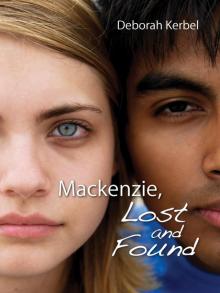 Mackenzie, Lost and Found
Mackenzie, Lost and Found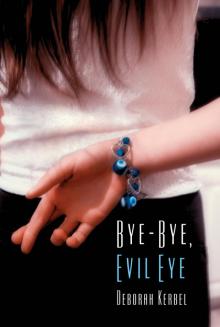 Bye-Bye, Evil Eye
Bye-Bye, Evil Eye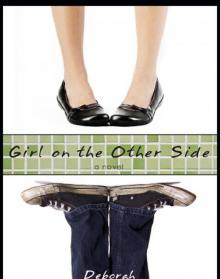 Girl on the Other Side
Girl on the Other Side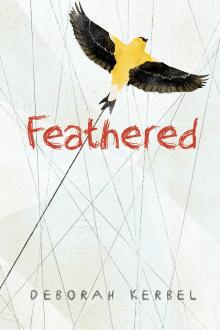 Feathered
Feathered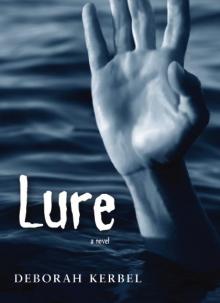 Lure
Lure